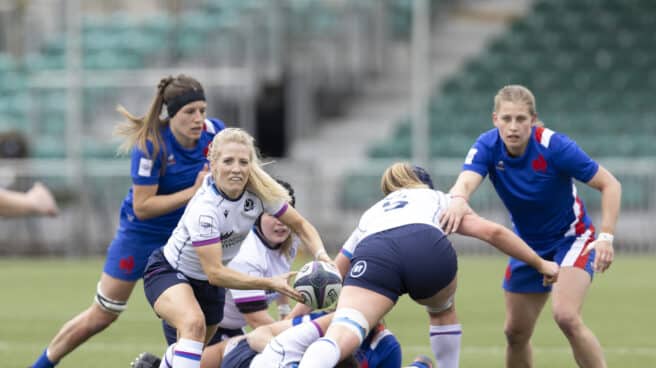

Rugby match between Scotland and France in April 2022 in Glasgow.
The Scottish Rugby Federation released a statement on Tuesday updating its gender policy, which will come into effect on 1 February. As they explained, the main change they have made is that from now on “contact rugby for female players is limited to those whose sex was registered as female at birth”, which would make it impossible for trans women to compete. However, they will be able to do so in non-contact gaming modalities like Tartan Touch.
So far, transgender women have been able to compete in Scottish women’s competitions depending on the result. a “thorough medical process” that included testosterone testing. The federation itself clarified that the new policy, which is now coming into force, will be reviewed at least once a year, taking into account new data and scientific studies that are made public.
This update to Scotland’s gender policy is due to the start of preparations for the Women’s Women’s Rugby Cup, so teams needed “up-to-date information on player eligibility criteria”.
trans men
However, the statement explains that transgender men will be able to continue playing contact rugby in the men’s categoryif the club with which the player is registered has carried out a “risk assessment” and the result has been registered by the federation.
The federation itself admits that this is a controversial decision, because. “difficult and unfortunately divisive” question, in which they assure that they wanted to approach this delicately in order to try to ensure that the participants “have a positive experience” and be as inclusive as possible. “We impose such eligibility restrictions only on the basis of guidance provided.. The decision to change our eligibility criteria was not taken lightly as we seek to accommodate conflicting opinions.’, collected in the text.
The move, they say, aims to make “safety” a priority and is in line with World Rugby’s transgender policy advice and guidelines and guidelines provided by the UK Sports Councils Equality Group. The statement ends with a promise to support those affected and offer advice to clubs and players. they commit to support the debate and revise their gender policies accordingly.
The news came a few days after Guardian published an article stating that World Athletics, an organization dedicated to athletics at the international level, sought to facilitate the participation of trans women in women’s competition.. Athletes will have to undergo treatment to halve their testosterone levels until they fall below 2.5 nanomoles per liter over two years, instead of the 12 months currently required, according to a British newspaper.
Source: El Independiente